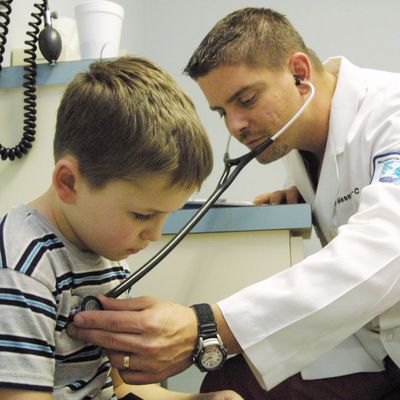
Americans are dying younger, the Centers for Disease Control announced on Thursday. Life expectancy in the U.S. declined again in 2017, falling one-tenth of a year, to 78.6 years. While the top ten causes of death haven’t changed, certain causes have become deadlier over time, as the nation totaled 69,000 more deaths in 2017 than it did in 2016. The CDC’s National Center for Health Statistics found that “overdose deaths reached a new high in 2017, topping 70,000, while the suicide rate increased by 3.7 percent,” according to CNN. Suicide rates are concentrated in rural areas, and deaths from diabetes complications also increased.
American life expectancy has declined by three-tenths of a year from its peak of 78.9 years in 2014. And while Americans get sicker, their counterparts in other developed nations have begun to live longer lives. “Life expectancy is 84.1 years in Japan and 83.7 years in Switzerland, first and second in the most-recent ranking by the Organization for Economic Cooperation and Development. The U.S. ranks 29th on that list,” Marketwatch reported. The old canard — that correlation isn’t causation — still holds, but it’s worth mentioning that most other developed nations have some sort of robust public option for health-care coverage in place. Japan, for example, has publicly financed national insurance, and monthly premiums are determined by a person’s income.
The U.S., meanwhile, remains heavily dependent on a privatized system. That’s beginning to change, as more states pass Medicaid expansion, but the nation’s health-care system contains gaping cracks through which the sick and the poor routinely fall. Insulin prices tripled from 2002 to 2013, CBS News reported in May, and “costs for the drug from two manufacturers rose almost 8 percent in 2017.” A Yale University study released in 2018 found that the lower a diabetic patient’s income, the likelier it is that they’ve tried to ration insulin in order to save on expenses. Rationing can become deadly, as two high-profile cases illustrate: As reported by the New York Times, Alec Smith died of ketoacidosis, a serious complication of his disease, after trying and failing to find a health-insurance plan that would defray the costs of insulin and testing strips. And as I previously reported for The New Republic, Shane Boyle died of the same complication not long after starting a GoFundMe campaign to buy insulin. When he died, he was $50 away from his goal.
The Trump administration is notoriously hostile to the Affordable Care Act and its Medicaid expansion provision, a sentiment expressed not only in the rhetoric of Trump and his officials but in the explicit policy of the White House. Through the introduction of short-term health-insurance plans with skimpy coverage and other regulatory tricks, Trump has tried to bleed the ACA to death. While that effort hasn’t succeeded, he did introduce new volatility into the American health-care system, an act that will have consequences for Americans who have difficulty paying for basic health expenses. Though the trends recently stabilized, premiums initially went up and insurers left the ACA marketplaces.
Another report, released on Thursday by Georgetown University’s Center for Children and Families, found that the number of uninsured American children has begun to rise. In 2017, 3.9 million children were uninsured, up from 3.6 million in 2016. As Dylan Scott reported for Vox, this increase reverses a previous trend; the national rate of uninsured children had in fact been steadily decreasing. The report suggests a number of probable causes — Trump’s regulatory war on the ACA and last year’s lapse in funding for the Children’s Health Insurance Program, to name just two — and adds that most uninsured children live in states that have refused to expand Medicaid. “In fact, 3 in 10 uninsured kids in the U.S. live in either Florida or Texas, the two biggest states that have refused to expand Medicaid expansion under Obamacare,” Scott wrote. A lack of health insurance can be deadly for anyone, including kids; a 2009 study by Johns Hopkins University found that children without health insurance are 60 percent more likely to die in the hospital than are children with health insurance.
Considering these dismal reports on the state of America’s health, it’s not very surprising that running on health care worked out so well for Democrats this year.






























